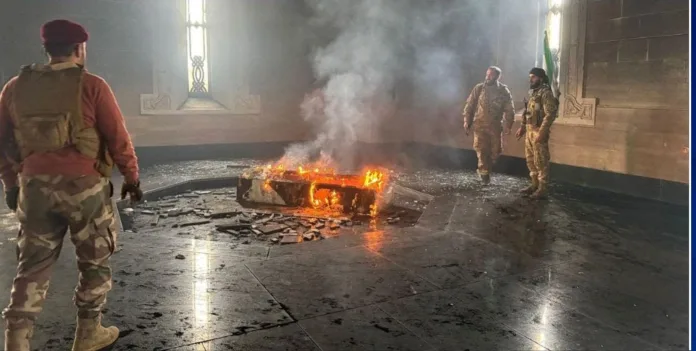In a profound display of resistance and symbolic defiance, Syrian rebels have set ablaze the mausoleum of Hafez al-Assad, the father of the current Syrian leader Bashar al-Assad. Located in their hometown of Qardaha, this act has sent tremors of unease throughout the nation and reverberated internationally. The incident was captured in various videos and images which quickly circulated across social media, showing armed men exulting amidst the flames. The rebels’ action draws stark attention to the enduring and bitter opposition to the Assad regime, which has ruled Syria with an iron fist for decades. This development is not just a localized act of rebellion but part of a broader narrative of resistance against a government known for its ruthless methods and comparison to the rule of Iraq’s Saddam Hussein. The symbolic destruction of Hafez al-Assad’s tomb reflects the rebels’ disdain for a legacy they regard as oppressive, corrupt, and violently repressive. As Syria grapples with ongoing civil conflict, which has claimed hundreds of thousands of lives and displaced millions, the rebels’ actions highlight the deep-seated dissatisfaction with the Assad family’s grip on power.
The burning of the mausoleum is more than an act of desecration; it represents a challenge to the regime’s narrative of historical legitimacy and reverence, embodied by the preserved remains of Hafez al-Assad. The Syrian government has condemned the event, framing it as a barbaric attack against the country’s history and identity, while pointing fingers at external actors allegedly inciting such actions to destabilize Syria further.
Internationally, opinions diverge sharply. Human rights organizations point to this event as indicative of the broader, unresolved grievances within Syria, calling for renewed international focus on a sustainable resolution to the conflict. Meanwhile, analysts draw parallels with past instances of defacing symbols of authoritarian rule, such as the toppling of statues during revolutions, highlighting this as a potent form of protest that targets the past to forge a new future.
The event underscores the complexity and the seemingly unending cycle of violence in Syria, where symbolic victories often precede further escalations and retaliation rather than tangible, peaceful resolutions.
Perspectives
Perspective 1: This perspective views the incident as a symbolic act of rebellion against a regime that has long oppressed its people. The rebels’ decision to burn the mausoleum is seen as a visceral rejection of the legacy of Hafez al-Assad, highlighting the regime’s continued human rights abuses and lack of accountability. It underscores the enduring spirit of resistance among those opposed to Assad’s rule, marking it as a significant cultural and political statement in the ongoing conflict.
Sources:
BBC NEWS
CNN
Perspective 2: Another viewpoint frames the act as one of vandalism and disrespect towards Syrian culture and heritage. Pro-government voices argue that such actions not only target a political figure but also deeply hurt Syria’s cultural fabric. This angle emphasizes a need for protecting historical sites and maintaining national pride amidst conflict, urging greater international and local interventions to preserve Syrian heritage.
Sources:
Aljazeera
ABC NEWS
Perspective 3: A geopolitical angle considers the wider implications of such symbolic defiance against regimes
considered authoritarian by Western powers. Experts in international politics see this as an example of insurgent tactics that aim to weaken the psychological stronghold of authoritative leaders. Such acts could potentially stimulate further international discourse and interventions aimed at pressuring Assad’s regime with hopes of initiating meaningful reforms or negotiations.
Sources:
FP
THE GUARDIAN
